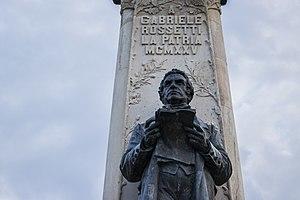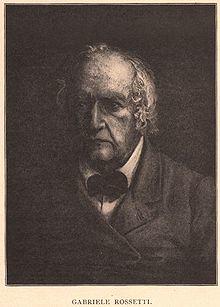Gabriele Pasquale Giuseppe Rossetti (28 February 1783 – 24 April 1854) was an Italian nobleman, poet, constitutionalist, scholar, and founder of the secret society Carbonari, who emigrated to England.
Rossetti was born in Vasto in the Kingdom of the Two Sicilies. Rossetti was also a Roman Catholic. His support for Italian revolutionary nationalism forced him into political exile in 1821.
Early career and exile
Rossetti's first edition of poems was printed in 1807 by Giovanni Avalloni, who offered to have Rossetti's poems published after hearing him recite a few passages. Throughout his early career, Rossetti published poems that were "patriotic" and supported the "popular movement" in Sicily which resulted in him receiving a grant from Ferdinand I of the Two Sicilies in 1820. When the king revoked the constitution in 1821, many supporters of the constitution were persecuted, but Rossetti instead, was forced into exile in Malta for three years before a British admiral of the Royal Navy sent Rossetti to London in 1824. He held the post of Professor of Italian at King's College London from 1831, as well as teaching Italian at King's College School, until failing eyesight led to his retirement in 1847.[1]
Rossetti's published works include literary criticism, Romantic poetry such as his long poem Il veggente in solitudine of 1846, and his Autobiography. He is thought to be the basis of the character Pesca in Wilkie Collins' 1860 novel The Woman in White.
He also wrote commentaries on Dante Alighieri in which he attempted to show evidence of mysterious ancient conspiracies in his works.[2]
He married Frances Polidori, daughter of another Italian exile Gaetano Polidori, and they had four children, all distinguished writers or artists:
- Maria Francesca Rossetti
- Dante Gabriel Rossetti
- William Michael Rossetti
- Christina Georgina Rossetti
Rossetti died in London, aged 71.
See also
- Rossetti–Polidori family
References
Further reading
- Dinah Roe: The Rossettis in Wonderland. A Victorian Family History, Haus Publishing, London 2011, ISBN 978-1-907822-01-8.


